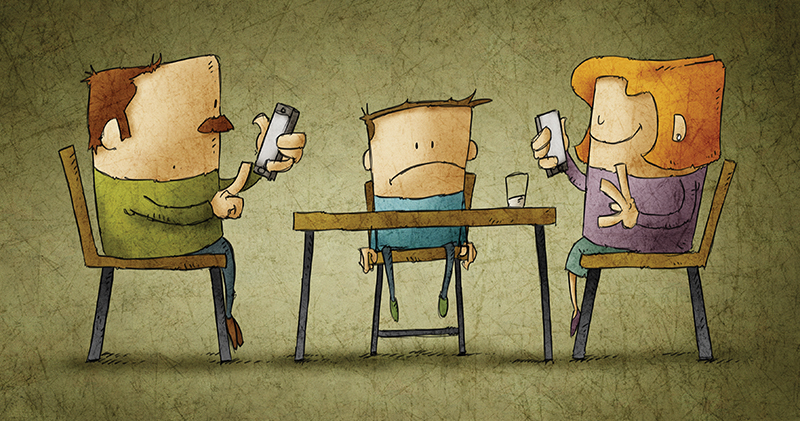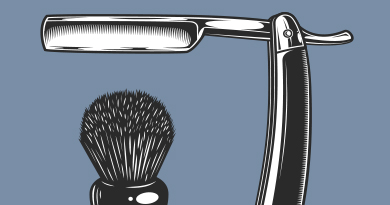Doctor, Doctor, It Hurts When I Do This
By Jeff Finkelstein
Technological paradigms have defined many of the major changes in our lives, from smartphones to smartwatches, from smart homes to smart TVs, from smart cars to smart cities. As we are all adjusting to our new normal for work and home, we are learning many ways to be productive and comfortable in both areas. With the start of shelter-in-place in early March and for the foreseeable future, we can expect many changes in how we relate to others. Not surprisingly, many of these changes are reflected by technology.
Even though I have been working from home for much of the past five years, I am still learning new ways to handle these communications. Add to that the stress of a pandemic as a life-changing event and no travel, which have led me to a strange pattern in my eating and sleep habits, all driven largely by actions outside of my own control.
Being a technology nerd, I like having the latest products even though I do not use all of their features. I convince myself that there are things available only with the latest technology that will be impactful to my personal and work life, but when I look back at it there are few of the new features that I actually use for more than a few days or weeks. For the musicians in the audience it is like getting a new instrument. You read about how someone famous uses it and you decide to give it a whirl. You get the new gadget and notice an immediate change in your playing. However, over time your old habits kick back in and you find yourself disillusioned with it. Wash, rinse, repeat. What’s the definition of insanity again?
Since isolation started, I’ve been making notes on things I do to better understand choices I’ve made for my work and home life. I have typically been a last-minute all-nighter warrior, waiting until a due date is upon me before really digging in deep. In the current new way of doing things I have forced myself to be more structured and split my time on multiple projects when I hit a creative brick wall, which turned out to be very helpful in producing more qualitative ideas, even though quantitatively my work output has not dramatically changed. One good by-product of taking notes on choices I make invariably shows me how my wife has been right all these years telling me I’m unintentionally funny at times. She was so right.
In this month’s column I’m going to share my thoughts on what I am calling “technology minimalism” and ways to regain some form of control over things. I hope it is worth your time reading and is not just another TL;DR — too long; didn’t read — article.
First, some hard facts based on research from MIT, Harvard, and a few other sources…
- 85% of cell phone users claim they cannot go a day without their phone
- 65% check their phones for messages, alerts, or calls, even when it did not vibrate or ring
- 90% of U.S. consumers use mobile devices as a second screen even while watching TV
- 50% of cell owners sleep with their phone next to the bed
- Traditional TV viewing of either broadcast or over-the-top is at six days per month actual viewing and twice that as background noise
- Researchers call “cell phone checking” or “smartwatch checking” the “new yawn,” because it is contagious to others.
We do not need to be reminded that technology addiction is a powerful drug, but we do need to always remember that it does have an off button. Really. Check your phone, tablet, and computer. There is an off button somewhere. You just looked for one, didn’t you?
The wisest know when to use the off button and take a more minimalistic approach to technology. Almost Zen in its simplicity.
Let’s look at reasons to disconnect:
Powering down helps you feel better about yourself. Too much of what we see on social media is a fantasy of how people want to represent their lives.
There is something strange about social media: Many people feel worse after visiting it and feel dissatisfied with their lives. While not every interaction on social media is a negative one, speaking for myself my personal experience validates the research. From family photos to vacation images, to the silly number of birthday greetings on a Facebook wall, the opportunity for envy presents itself too often on social media.
Powering-down for a period of time gives us an opportunity to refocus our energies and remember that we can be happy without all those screens.
Turning things off shows us we can survive without missing anything
We have no technology in front of us for 1/3 of the day while we sleep and yet somehow things manage without us. We spent eight hours without looking at pictures of food, getting into silly political debates with people we do not know, or looking at pictures of cats. Personally, I can never have too many pictures of pets.
It is the fear of missing out that keeps drawing us back to social media and the Internet. With the constant stream of inanities, we fear we will be left out of things and that fear grows on us until we satiate it by looking at our devices to see what we missed.
The same with smartwatches. Do you really need to have your wrist buzz every few minutes? If you use it for exercise or to monitor your sleep patterns, turn off the notifications or just leave on the calendar reminders.
Turning off technology and tuning out social media allows us to live in the moment. In the end this moment in time is all we have.
It is hard to be alone
How do you find solitude if you are always connected or afraid you will miss out on things by not being connected? Solitude allows us to find the quiet place required to truly relax and decompress from life.
The world is a noisy place. Not just in decibels but in information. Even worse, much of the information thrown at us at a neck-snapping pace is in the best case not necessarily well-researched or in the worst case demonstrably false.
As the signal-to-noise ratio of information keeps getting lower and louder we need to find a place for solitude to gather our thoughts and get rest even though it is easy to overlook the need for quiet. True relaxation requires the intentional act of shutting off the outside world.
Stuff happens, usually right in front of us
Who has not been at a restaurant and noticed how many couples and families spend their entire meal looking at their phones and rarely talking? How many of us have done that ourselves? I’m certainly guilty on occasion, at least until my wife takes my phone from me or even worse texts me to talk to her. Let’s not even talk about the shark tank incident.
I remember being at a concert and the person next to me had her phone in front of her face recording the concert. I asked her why she just didn’t watch it live and she said by recording it she could remember it. I had no comeback to that.
Life happens in front of us. Our kids grow up much too fast. Missing out on life because we are in a temporal place with our technology and self-importance is such a shame as we will never get that time back.
Create, don’t consume
We spend so much time in front of our technologies consuming. This article was written on my laptop, but most of the time on my computer I spend my time writing, communicating, researching, reading news, browsing the Internet, and watching Premier League Football (go Spurs!).
Too much time is spent consuming. We need to spend more time creating whatever is our passion or required for our job. My hobbies are music and photography, for others it could be fishing, biking, running, family games, or whatever is your thing of enjoyment. The very act of creating is a right-brain activity which gives our much-overused left brain a chance to rest.
Technology addiction can only be understood when it is taken away from us
Admit it, we are technology addicts. When I went on holiday with my wife last year and at her insistence, we left all technology home except our phones and Kindle readers. No tablets or laptops. Only took our smartphones and e-books. I did bring my trumpet, but that is my main hobby these days and not a technology, so it was okay with her (not so much for the people in adjoining hotel rooms).

The only true way to understand how bad our technology addiction has become requires us to put it aside and walk away. You will feel the gravitational pull of it almost immediately. You need to take baby steps away from that addiction, but you can do it one step at a time.
Life is about people, not technology
As professionals we have all taken classes over the years teaching us people skills for dealing with diverse teams, resolving conflict, developing our EI/EQ, and how to lead teams. In our current work situation, we lose out on the personal interaction on which those skills are based. As good as technology is there is nothing like sitting across from someone and in that moment of time being there in your entire essence.
Interacting with someone on a screen is what we have today. Our most fulfilling relationships are those in front of us either physically or virtually. While you cannot maintain the same level of interaction on a screen, you can accept that and work more diligently to create a new manner of conversation.
Start your day wisely
Don’t pick up your phone or fire up your computer first thing in the morning. Start your day away from technology by getting your coffee or tea, pet the dog, talk to your significant other and kids, or do something that does not need technology.
The world survived for eight hours without you. It can do so for another hour while you do whatever your form of morning meditation requires of you.
When you go on holiday do it without technology
Leave your work at home. Only take a smartphone and your books/Kindle. Maybe a smartwatch if you use it for exercise. Truly disconnect when you go away and find out more about your relationships. And I think you will also find out more about yourself.
Surviving without technology is one of the most important life skills we can all develop. That time spent without technology is your and your loved one’s time. It takes time to learn new disciplines, so take it one step at a time. I hope you find it as fulfilling as I do.
 Jeff Finkelstein
Jeff Finkelstein
Executive Director of Advanced Technology
Cox Communications
Jeff.Finkelstein@cox.com
Jeff Finkelstein is the Executive Director of Advanced Technology at Cox Communications in Atlanta, Georgia. He has been a key contributor to the engineering organization at Cox since 2002, and led the team responsible for the deployment of DOCSIS® technologies, from DOCSIS 1.0 to DOCSIS 3.0. He was the initial innovator of advanced technologies including Proactive Network Maintenance, Active Queue Management and DOCSIS 3.1. His current responsibilities include defining the future cable network vision and teaching innovation at Cox. Jeff has over 43 patents issued or pending. His hobbies include Irish Traditional Music and stand-up comedy.
Shutterstock




